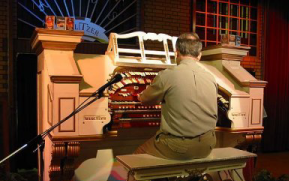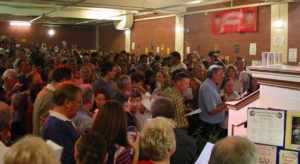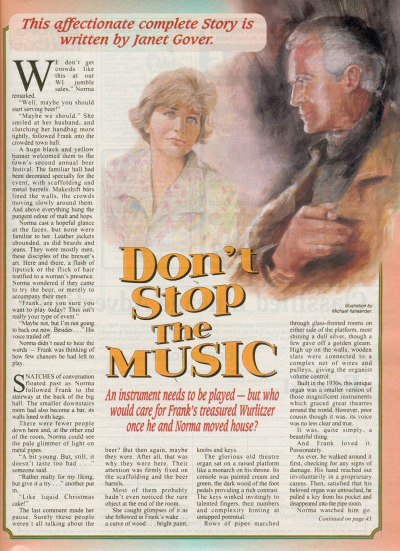“We don’t get crowds like this for WI jumble sales.”
“Maybe you should start serving beer.”
Norma smiled at her husband. “Maybe we should.” Clutching her handbag tightly, she followed Frank into the crowded hall.
A huge black and yellow banner welcomed them to the town’s second annual beer festival. The familiar hall was strangely dressed for the event – in scaffolding and metal barrels. Makeshift bars lined the walls, the crowd moving around them in a slow dance. And above all, the pungent odour of malt and hops.
Norma cast a hopeful glance at the faces, but none were familiar. Leather jackets abounded, as did beards and jeans. They were mostly men, these tasters of the brewers art. Here and there, a flash of lipstick or the flick of hair testified to a woman’s presence. Norma wondered if they came to drink, or merely to accompany the men who drank.
Already some were definitely the worse for wear. Near the door, two men were helping a third to his feet. Or rather, trying too.
“Frank, are you sure you want to play today? It’s not really your type of event.”
“Maybe not, but I’m not going to back out now. And besides…” his voice trailed off. After a lifetime together, Norma didn’t need to hear the words. Frank was thinking how few chances he still had to play.
“…better than last year. There are more breweries represented and…”
“…tried their new brew. It’s a special just for the festivals…”
Snatches of conversation floated past as Norma followed Frank to the stairway at the back of the big hall. The smaller downstairs room had also become a bar, the wall lined with kegs.
The crowd was thinner down here, and at the other end of the room, Norma could see the pale glimmer of light on metal pipes.
“…a bit young. But still it doesn’t taste too bad… ”
” …a bit malty for my liking, but give it a try…”
“…like liquid Christmas cake.”
That made her pause. Surely they weren’t all talking about beer? But then again, maybe they were. After all, that’s why they were here. Their attention was firmly fixed on the scaffolding and beer barrels. Most probably hadn’t even noticed the rare beauty at the end of the room.
She caught glimpses as she followed in Frank’s wake. A curve of wood. Bright paint, knobs and keys.
The glorious old theatre organ sat on a raised platform, above the crowds in a place of proper respect. The console was painted cream and green, the dark wood of the foot pedals providing a rich contrast. The keys gleamed an invitation to talented fingers, their number and complexity a hint of untapped potential.
Rows of pipes marched through glass-fronted rooms on either side of the platform. Most shone dull silver. A few gave off a golden gleam. High on the walls, wooden slats connected to a complex net of wires and pulleys gave the organist volume control.
Built in the 1930’s, the antique organ was a smaller version of the magnificent instruments that graced the great theatres of the world. Poor cousin though it was, it’s voice was none the less clear and true.
It was, quite simply, a beautiful thing.
And Frank loved it. Passionately.
As always, he walked around it, checking for any sign of damage. Unconsciously, his hand reached out in a proprietary caress. Satisfied that his beloved organ was untouched, he pulled a key from his pocket and disappeared into the pipe rooms.
Norma let him go. Moving behind the platform, she found the bag Frank had carried for her. As she had so many times before, she set about her part of the performance.
From the bag, she pulled a thermos flask, tea bags and sugar. She put them on the small table, followed by two mugs and a plastic container full of sandwiches. Norma had seen the food stall in the main hall. Obviously food wasn’t as important as beer! She and Frank would be glad of these sandwiches.
“I wonder how old it is. It looks in good order.”
Norma glanced up to see two large men, not overly steady after a few drinks, gazing at the Wurlitzer. One set his glass down on the stool.
“Gentlemen, do you mind.” She stepped forward and indicated the glass.
“Oh, sorry love.” The glass vanished.
Norma pulled out a handkerchief to wipe away the mark of disrespect.
“They say someone will be playing this later on. Is that right?”
“Yes, in about 15 minutes, I think.” Norma smiled, pleased by the interest.
“It’s not you playing is it?”
“No, my husband.”
The men nodded and moved away. “Let’s get back upstairs, before it starts.” The words were whispered, but loud enough to reach Norma’s ears.
She turned quickly, glad that Frank hadn’t yet emerged from the pipe rooms. Now, of all times, he didn’t need to hear comments like that. He had so little time before he said goodbye to the classic instrument that he had so lovingly restored.
Norma was looking forward to their forthcoming move to a new home, closer to their daughter and grandchildren. The small bungalow would be easier to manage and certainly cheaper. Now Frank was retired, they had no need to be close to the city. Everything about the move was right, except for one thing.
The organ.
Frank tried to pretend it didn’t matter, but it did.
He had loved the organ since the day he discovered it – in pieces, slowly disintegrating under dusty sheets in a long disused storeroom. He’d spent many months bringing the long neglected organ back to its former glory. He gave his every spare moment to his new love.
It was hard work, but a perfect pastime for a newly retired draughtsman. Norma had helped as best she could, baking cakes for fund-raising raffles
and street stalls. The project was something to share as they accustomed themselves to the new realities of retirement.
Frank had been repaid a hundred fold with endless hours of pleasure in his work, and later as a performer, entertaining others at community functions.
His happiness had also been Norma’s.
Frank was content with their decision to move. Or would be – if only there was someone to take his legacy.
That was the real problem. There was no-one else to care for and play the organ. Frank was torn apart at the prospect of it lying unused and slowly decaying. And in the years to come, when the old hall gave way to progress? What then for an unwanted and archaic instrument?
Neither of them liked the answer.
The click of the pipe room door alerted her to Frank’s return. Setting aside her melancholy, she poured two cups of tea.

“Would you like a song sheet? Here you are. The music will start in just a few minutes.” Norma moved through the crowd, distributing the photocopied sheets. “Of course, sing along. That’s the whole idea. Don’t worry about knowing the words. Here, have a song sheet.”
Norma could feel the uncertainty. They were here for the beer, not to listen to “some old geezer play an organ”. The man who spoke those words declined her offer of a song sheet.
Norma hid her fears behind a wide smile. Usually Frank’s recitals were a key element of whatever school or church or community function was taking place.
But not today.
Today, the music was an almost accidental addition, accepted by the organisers because it was free. The beer was the main attraction. Still, Norma hoped there would be some crowd participation for Frank to enjoy. He didn’t have many chances left.
He husband’s eyes sought her out her smile before he placed his fingers lovingly on the keys. The first note surged up from the depths of the organ, and the pipes and his soul, and burst out into the room.
The note was strong and true, followed by another and another, until the song was a living thing, moving through the crowd.
Frank didn’t have a great singing voice. He was the first to admit it. But when he played, it was as if the organ itself helped, giving his voice a richness that it didn’t have alone.
“Oh Danny Boy
The pipes, the pipes are calling…”
The chatter around him stilled, and heads turned. The music coaxed and teased the crowd, and gradually, a few voices rose to join the song.
“From glen to glen
And down the mountainside..”
Norma watched Frank’s fingers on the keyboard. She knew every line and movement of his hands. For more than 40 years, she had known his hands – reaching for her in the night, holding his child, working to support their small family. They were musician’s hands too.
“But come ye back,
When summer’s in the meadow…”
The voices were louder now, stronger and more confident. And when the song rose to its climax and ended, cheers rippled around the room. Frank waved one hand to acknowledge the applause, while his other was already moving into the first chords of the next song.
This time there was no hesitation. A hundred voices joined Frank in the opening chorus.
To Norma’s left, heads appeared in the doorway. Drinkers from the vast hall above, drawn by the song. They reached for the offered song sheets, heads already nodding in time to the music.
Norma stepped aside as a rotund gentleman with a bushy beard danced past. His long grey ponytail swung wildly as he twirled, arms waving like a demented teddy bear, his face glowing with pleasure.
All around her, the crowd was swaying in time to the music, their raised hands still clutching beer glasses. Beer occasionally spilled over. But not too much! This was a beer festival and these were seasoned drinkers.
The room was becoming very hot and stuffy. The song sheets took on a second role, doubling as fans to cool sweating brows.
Two young men in leather jackets pushed gently past. They were heading for the exit. The taller of the two, sandy-haired and no more than 20 years old, stopped. He shook his head, and the two exchanged words. The tall man turned back towards the organ, leaving his friend to leave alone.
Frank changed tunes, and the crowd began to murder an old Beatles song.
Norma moved to a vantage point, at the back of the organ platform. She could see the barmen now. They had stopped filling glasses, and started singing.
She could also see the security men exchanging frantic hand signals across the room. They looked like bouncers at a rock concert. At least, what Norma imagined bouncers would look like. She’d never actually been to a rock concert, although she and Frank had danced at big band recitals in their youth. Frank had cut quite a dashing figure in those days, turning more than a few heads.
And still was, from the face of the woman at the front of the crowd. Somewhere in her early forties, she sported dyed blonde hair and a low cut red top. Her eyes were glued to Frank. She nodded vigorously in time to the music, pushing her gold rimmed glasses back each time they slid down her nose.
Norma smiled. She would enjoy teasing him about that.
“Pack up your troubles in your old kit bag,
And smile, smile smile.”
As the crowd took up the familiar refrain, Frank suddenly leaped to his feet. Standing with his back to the silent organ, he raised his arms in a conductor’s stance and to lead the crowd through the song. Not one in ten of his choir was singing in tune, but that didn’t matter. The combined voices and the joy of the moment lifted the room above such mundane concerns.
They all joined in, even those too young to remember the song or the terrible times it represented.
A light flashed, as someone somewhere in the crowd recorded the moment.
Frank spun and dropped back onto the seat, his hands moving unerringly to pick up the chorus and guide the song to a thundering crescendo.
In the few moments of silence that followed the riotous applause, a bell clanged.
“Last orders please, ladies and gentlemen. Last Orders!”
Norma waited for the singers to desert the organ, to grab that last glass beer. But none did. Whistles and cheers echoed off the rafters. Frank bowed, and set his hands once more at the keyboard.
When the last note of the last song faded, the applause lasted for a long long time.
As they filed out of the room, singers stopped to shake Frank’s hand, and thump his back. His face was shining, revelling in every minute of it, not just for himself, but also for his beloved Wurlitzer.
Norma’s heart contracted. She turned to pack away the tea things, trying hard not to think of the future.

In a short time, the room was empty, except for the barmen cleaning glasses, and a young man walking towards the organ, a glass in his hand.
“I thought you might like a drink.” He handed the glass to Frank. “It’s BS Johnson’s Old Orang-utan. A fine drop. I hope you like it.”
“Thank-you.” Frank took a deep draught. “That’s good. Singing is thirsty work.”
Norma recognised him now. This was the sandy-haired young man who had argued with his friend, coming back alone to listen to the music.
“Man, that organ is something else,” the young man’s voice was filled with awe. “I’ve never seen anything like it before. It’s beautiful.”
Of all the words he might have spoken, nothing could have pleased Frank more.
“She sure is. Not one of the great ones of course, but special all the same.”
“How old is she?”
“Built in the 1930’s. She was in pretty bad shape when I found her. It took a lot of work. But she’s in fine voice now.” Pride was obvious in Frank’s every word, and in the way he stroked the gleaming paint.
“You restored her? Where did you get the parts? And the pipes?”
“Some I repaired, some I made and the rest – well, you can always find what you need, if you look hard enough.” Frank beamed at the eager face. “Come on up.”
The younger man didn’t need a second invitation. He leaped onto the platform, and settled onto the stool like he belonged there.
“I play, you know,” he offered in a consciously off-hand tone. “Just a little electric organ, of course. Nothing like this.”
“Why don’t you have a go. Look, I’ll just set these… so.” A few muffled thumps sounded deep inside the organ, as Frank re-set the controls. “There you go. Play something for me.”
Tentatively the other man reached out one hand, and gently stroked a key. A single note, high and clear soared across the almost empty room. He tried another note, then a short combination.
Frank nodded his approval as the young musician gently established a rapport with the instrument.
Watching then, Norma was struck by how different, yet alike the two men were.
Frank was so conservative in dress and manner, yet passionate about the things he loved.
The younger man, by contrast, was clad in a wildly dyed T-shirt. His hair was long and unkempt, and a gold hoop hung from one pierced ear. His hands were stained and roughened by hard work, yet gentle on the keys. And the concentration he gave his music was exactly the same as she had seen so often in Frank’s face.
With both hands on the keyboard, the young musician finished his exploration of the instrument. He coaxed a familiar melody from the organ, and began to sing.
“Are you going to Scarborough Fair,
Parsley, Sage, Rosemary and Thyme…”
From the back of the hall, deep voices joined in harmony.
“Remember me to one who lives there.
She once was a true love of mine.”
The other barmen, without pausing in their work, had joined the song, the empty hall echoing their voices in rich refrain.
As they sang, Norma watched joy light her husband’s face.
“That was fabulous.” Frank applauded softly as the last notes faded away. “It wouldn’t take you long to understand this old girl.”
“I’d love to learn. Would you teach me? Can you spare the time?” The young man held out his hand. “By the way, my name’s John.”
As he shook the offered hand, Frank caught his wife’s eye. Norma nodded and opened her bag to unpack the tea-bags and thermos.
“I’m Frank,” he replied. “And I’ve got all the time you need.”
A Song in His Heart
Published as “Don’t Stop the Music” by The People’s Friend – April 2003
Artwork by Michael Italiaander courtesy of The People’s Friend
Photographs by Chris Nevard, copyright www.nevard.com
My first English beer festival was like nothing I had ever seen before. Thanks to Chris Nevard for taking the photos that kept the flavour of the event alive for me while I wrote the story. I received my first reader letter in response to this story. It is amazing to think that my words touched that reader’s heart.
© Janet Gover 2002


Leave a Reply